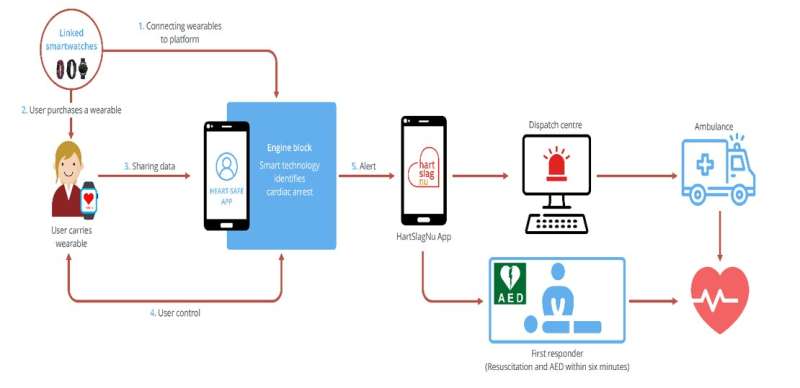
The University of Twente and its partners are developing a smart wearable to automatically and reliably detect out-of-hospital cardiac arrest (OHCA), and to trigger an immediate emergency response. The UT (Technical Medical Centre) will test the effectiveness of the proposed platform using simulation models and measure the impact on survival and response time. The study is published in Resuscitation Plus.
Of approximately 17,000 persons suffering annually from out-of-hospital cardiac arrest (OHCA) in the Netherlands. Many die or have poor neurologic outcomes because Emergency Medical Services (EMS) are alerted too late or not alerted at all (unwitnessed cardiac arrest).
Associate professor dr. Derya Demirtas of the UT explains their state-of-the-art solution: “We propose a technical solution to automatically and reliably detect OHCA, and to trigger an immediate emergency response. Our solution will significantly decrease the time to cardiopulmonary resuscitation (CPR), potentially saving thousands of lives each year and improving neurologic outcomes.”
Artificial intelligence
“We are developing an open-source cardiac arrest detection algorithm based on signals derived from photoplethysmography (PPG) and additional sensors in commercial smartwatches. PPG is an established medical technology. Capable of continuously monitoring the pulse rate and oxygen saturation.”
“By measuring changes in light absorption at characteristic wavelengths during pulsatile blood flow generated by the heartbeat. As suggested by clinical experience and pilot data, PPG can reliably detect the absence of pulsatile blood flow. Additional sensors including accelerometers and GPS enhance the diagnostic accuracy and provide essential location data.”
https://www.youtube.com/embed/hcxDLJa5_wU?color=whiteCredit: University of Twente
Device-independent interface
“We deliver a device-independent interface (the ‘engine block’) between the cardiac arrest detection technology and the citizen rescuer system HartslagNu as well as EMS dispatch centers. As part of the engine block, we develop the HeartSafe app, which provides audio-visual alerting of users and a stop button for canceling a false alarm.”
“The engine block also provides GDPR-compliant profile storage, providing essential medical data to rescuers and additional information needed to access the patient. The technical developments will be accompanied by extensive research. User research, signal-data research, a field lab and simulation studies will be performed to understand user needs, to train the AI-algorithm, to evaluate the technology, and to estimate the impact on survival and quality of life.”
University of Twente

